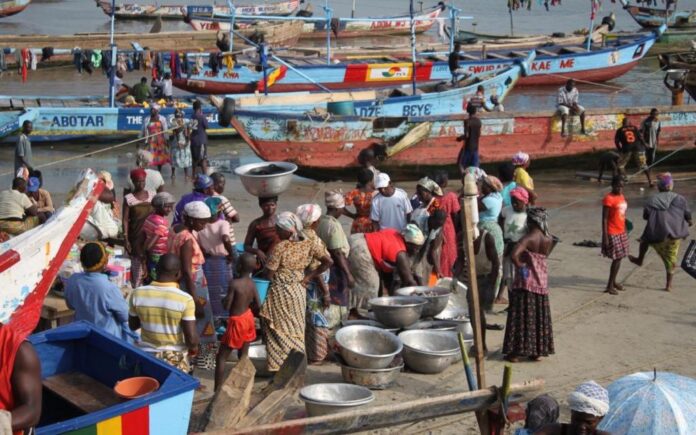Some fishermen and fishmongers with empty basins
[Photo Credit: myinfogh]
Author: Edith Debrah
Fishermen in Ghana are expressing concerns over the slow start to the fishing season, with many reporting a lack of catch since the sea was reopened after the closed season.
The closure was implemented in an effort to protect fish stocks and allow them to replenish. However, despite the reopening, fishermen are struggling to secure a good catch.
A seasoned fisherman from Azizanya, a fishing community in Ada in the Greater Accra Region, Justice Edward Amesimeku, has voiced his frustration over the situation.
“This is just the beginning of the five-year term I have predicted that if fishermen, Fisheries Enforcement Unit (FEU), Fisheries Commission and other stakeholders do not comply to the laws, and enforce it to bring back the dead state of our industry to life, I am afraid we will have ourselves to blame,” he said.
He added, “Since day one of the reopening of the closure, there has been no catch at Azizanya and if we are beating around the bush without going straight to the main cause of the fish stock depletion, then no one should blame anybody.”
Adding to the grievance, an executive member of Ghana National Canoe Fishermen Council (GNCFC), Mr. Mike Abaka-Edu of Axim, shared his thought about the current fishing season.
He explained that, this season, only a limited number of canoes were allowed to go out to sea and even those numbers faced significant damage from a new wave of tides.
Waves can be dangerous obstacles that can swamp an open boat with water or roll a vessel to its side. Even if you have a large boat, steering improperly through large waves can lead to disaster.
“The tides have been particularly destructive, damaging many of the artisanal canoes used for fishing”.
Like what happened to the Fisherfolk at Ada in the Ada East District in the Greater Accra Region, they woke up to the news of an accident involving two fishing canoes which had capsised after their canoes were hit by strong waves near the estuary at Azizanya, with seven crew members missing.
“Last year, the fishermen went on fishing trips about 15 times, while this year they have only been able to go out seven times so far.As a result, the overall catch this year compared to last year is not encouraging,” he said.
Despite the challenges faced during these early weeks of the fishing season, the fishermen remain hopeful for a better outcome in the coming days. They are relying on favourable conditions and improved catch rates to make up for the slow start.
Purpose of the Closure
The 2023 Fishing Closed Season as announced on June 14, 2023 by the Minister of Fisheries and Aquaculture Development, Mavis Hawa Koomson, was to ensure sustainable fishing practices, by the artisanal and inshore fleets to adhere to the closed season from July 1 to July 31, 2023 with the industrial trawl vessels extending their closure until August 31, 2023.
The closure is a crucial measure implemented to protect the fishing industry and ensure the sustainability of fish stocks in Ghana. During this period, fishing activities are prohibited in the country’s coastal areas to allow fish species to spawn and reproduce, ultimately replenishing their populations. By temporarily halting fishing activities specifically during the spawning season, the closed season helps prevent overfishing and allows fish populations to recover.
It is quite evident the closed season results in temporary challenges for fishermen, such as a decrease in income and no catch rates during the closure. But its long-term benefits outweigh these short-term difficulties because it is an investment in the future of the fishing industry, ensuring sustainable fishing practices and the preservation of Ghana’s marine resources for generations to come.
But what does this mean if after the closed season, there are still not enough fishes to catch?
Fish, for some reason, is a main food source for people who are unable to afford chicken or red meat whose prices have more than doubled over the last year. Have we asked ourselves what the poorer people in poverty-stricken countries like Ghana would do, if seafood becomes unavailable as a food source?
For the over three million people who depend on this industry, an increase in poverty, malnutrition and starvation would be the consequence.
A world without fish is a scary prospect I must say. The fish we have now is very low in catch and three times expensive. People will starve to death as they lose one of their main food sources and income. Others will become jobless, leading to a double of the current unemployment crisis in the country.
Everyone would feel the effects of a world without fish in the sea.






































